San Francisco 49ers: Final 2010 Grade Report
San Francisco 49ers: Final 2010 Grade Report

The 2010 season did not work out as planned for the San Francisco 49ers. Prior to the season, all of the experts, myself included, were predicting the 49ers would win the NFC West—and not with a 7-9 record.
When the 49ers went out and won all of their preseason games, it simply added to the hype. The Niners took a plane flight to Seattle and their season began to crumble. The 49ers lost badly in Seattle and never recovered, as they struggled all season.
Here is the final grade report for the 2010 season. It won't be pretty, as no 6-10 season ever is.
Quarterbacks: Grade = D-
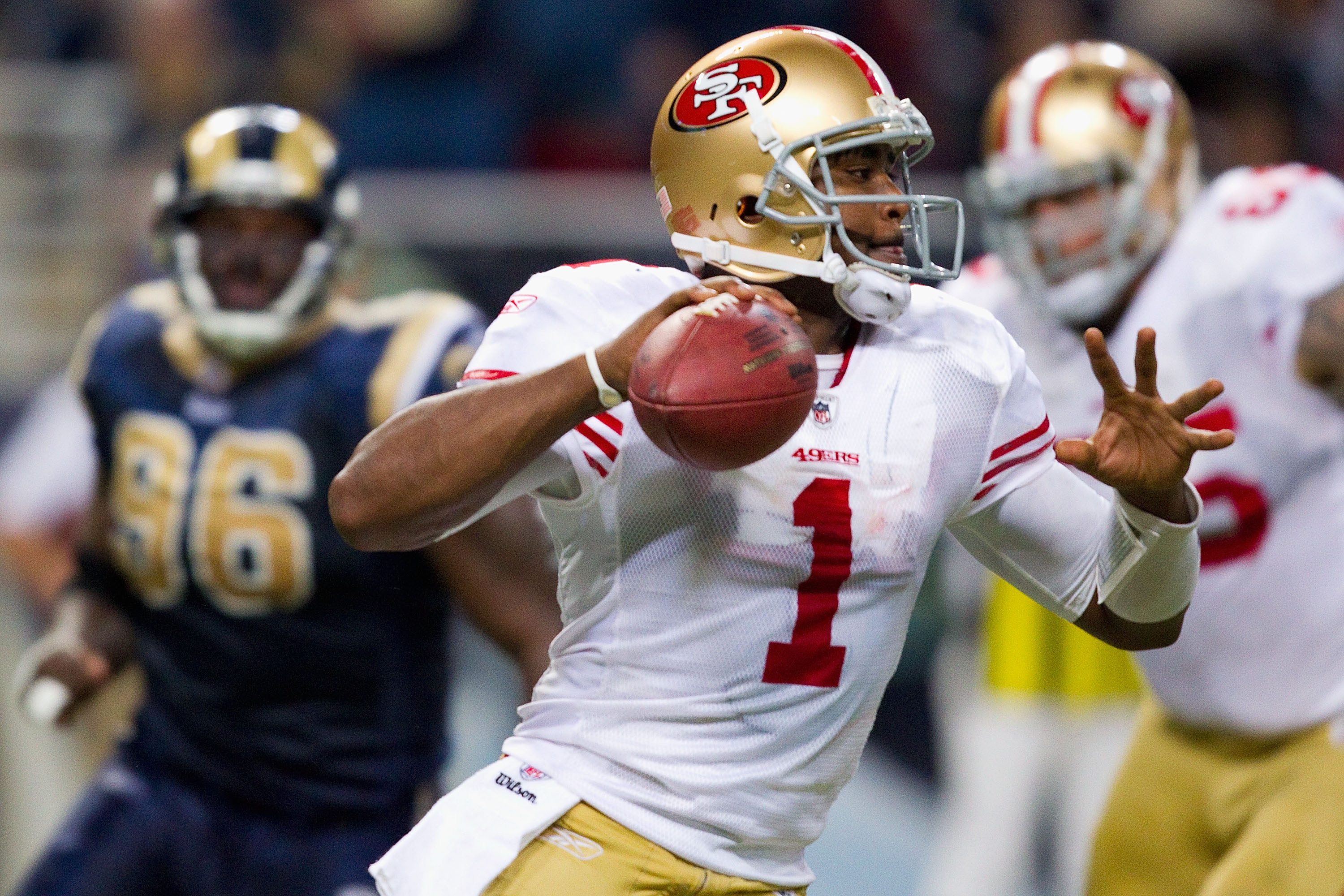
I must be in a very good mood, because I could have easily given the quarterbacks an F. The only reason I didn't is because there were many other problems on the offensive side of the football and the quarterback does not live in a vacuum.
Mike Singletary's musical quarterback approach proved unsuccessful and his handling of the quarterback situation was a major reason behind his dismissal. In two games, Singletary got into heated arguments with his quarterbacks on the sidelines.
Poor offensive line play was also a big contributing factor in the lack of consistency out of the quarterback position. Both Smiths were constantly under pressure from on-rushing defenders, as the 49ers offensive line had problems with pass protection all year.
Alex Smith began the season as the No. 1 quarterback for the 49ers. He ultimately started 10 games and the Niners only won three of them. To be fair, the 49ers were leading against Carolina when he was injured. The end result was a loss when David Carr did nothing and the 49ers defense broke down late in the game. Nevertheless, Alex Smith did not win enough ball games.
Statistically, Alex Smith was OK. He completed 204 of his 342 pass attempts, a 59.6 completion rate. He also threw 14 touchdowns against 10 interceptions. Alex Smith's yards per game was only 215.5, which is low in today's NFL.
The biggest issue with Alex Smith is he often played just well enough to lose. He had some fine moments out there, but frequently made the one killer mistake that got you beat.
As a free agent, there is no doubt in my mind that Alex Smith will not be back. The fans in San Francisco largely despise him and boo him at every opportunity. It would be best for all concerned, including Alex Smith, if he just moved on.
Troy Smith is another story, He started out very well, helping to lead the 49ers to wins against the Broncos and Rams in his first two starts. The league got more film on him, however, and defenses made adjustments to counteract his effectiveness. Troy Smith's completion rate went down substantially after those first two games.
Also a free agent, it would not surprise me if Troy Smith was signed as a backup for the coming year, as he did show some promise. Troy was much better at throwing the long ball than Alex Smith and he also was able to use his legs more effectively. His completion rate of 50.3 percent is not NFL caliber, however.
Troy Smith also had problems in the pocket and seeing over defensive linemen because of his lack of size. His accuracy on the short-to-medium distance throws also was lacking. As a starter, Troy Smith won three out of his six starts, but his performance declined as NFL teams prepared for him. Also, the win against Arizona in Week 12 was largely the result of a superior rushing attack, not Troy Smith.
At this stage of his career, Troy Smith is not a top tier NFL quarterback, which you need in order to compete for the playoffs. He may develop that ability at some point, but he's not there yet. The accuracy issue is my greatest concern, as that's something you absolutely need to be successful.
As for David Carr, I have only one question. Why did we ever get rid of Shaun Hill and get David Carr?
Frankly, with Shaun Hill, the 49ers probably would have made the playoffs.
Quarterbacks: Grade = D-
Running Backs: Grade = B+

Frank Gore is one of the top running backs in the NFL. In 10 games, Gore rushed for 853 yards but only three touchdowns. He also had two touchdown receptions, but his inability to get into the end zone was a key factor in the 49ers offensive struggles.
The 49ers lack of offensive production was not Gore's fault, however, as he played well, except for his four fumbles. Frank Gore was injured early in the tenth game of the season, against Tampa Bay. The 49ers must hope that the broken hip he sustained will heal and that Gore will be back strong for the 2011 season.
I strongly believe the cumulative pounding Gore took wore him down and the injury was a direct result of that beating. Prior to his injury, Frank Gore played almost every offensive down. This was true even late in some games when the 49ers had no chance. I seriously question the wisdom of Mike Singletary for allowing Gore to take such a pounding when games were out of reach.
In addition, the 49ers made a great acquisition just prior to the season by signing Brian Westbrook. He is a former Pro Bowl running back and brought speed, pass catching ability and experience to the Niners. The problem was that Westbrook was seldom used and languished on the bench until Frank Gore got hurt. This was simply poor coaching.
I believe Westbrook could have spelled Gore for a series or two here and there. He also would have been an excellent third-down back on passing plays. Unfortunately, the coaching staff never gave him the chance until Gore went down.
Brian Westbrook proved he still had some tread on the tires as, in the first game after Gore was injured, he rushed for over 100 yards. Westbrook also ran for four touchdowns and caught one for a total of five, the exact amount of scores that Frank Gore had. The difference was that Westbrook got his five touchdowns in only 93 touches, whereas Gore had 249 touches.
Third-string back Anthony Dixon, a rookie, showed good promise and has the potential to be a No. 1 back in the future. It would have been wise to allow Dixon to get some action late in those games the 49ers were destined to lose. It would have eased the pounding that Frank Gore took while also giving Dixon some valuable experience. Yet another coaching blunder by Mike Singletary.
Running Backs: Grade = B+
Wide Receivers And Tight Ends: Grade = C-

Let me start by stating that I would give the wide receivers an F and the tight ends an A-. The cumulative result is the C- grade this group received.
The wide receivers on the 49ers did not do the job. It started with Michael Crabtree who basically did not play in training camp, due to what many believe were phantom injuries. The result was that he and Alex Smith were woefully out of sync early in the season, which resulted in several missed connections and interceptions.
Michael Crabtree was also called out and almost came to blows with Vernon Davis, who objected to his poor practice habits and overall diva attitude. For the season, Crabtree had only 55 receptions for 741 yards, which is far loo low for your No. 1 wide out.
Across from Crabtree was Josh Morgan, who made some excellent plays, but also had some extremely poor plays as well. Morgan caught 44 passes for 698 yards, but he also made very weak efforts on several passes that he could have caught.
There are two other key factors with the lack of production from Crabtree and Morgan. The pass protection was poor so the quarterbacks often did not have time to find them. However, it was widely known that these receivers often ran poor routes and were not where they were supposed to be. The poor route running was a direct cause in some of the interceptions thrown by both Alex and Troy Smith.
Ted Ginn Jr. made almost no impact as a wide receiver this year and it was plain to see why Miami gave up on him. Ginn rarely made strong efforts to catch the ball, especially over the middle, where his alligator arms were painfully apparent.
Dominique Zeigler has potential, but rarely saw playing time. Then he was injured in the 11th game of the year and missed the rest of the season.
The tight ends were by far the 49ers best weapons in the passing game. Vernon Davis led the team with 56 catches for 914 yards and seven touchdowns. His production was down from the 2009 season, but that was largely an issue with the play-calling along with poor offensive line and quarterback play.
Vernon Davis is also a very strong blocker in the run game. He also emerged as a leader on the 49ers and is well respected by his teammates.
Delanie Walker had what I would deem a very successful season. He was a player the opposing defenses could not match up well against when he and Vernon Davis were in together. As the season progressed, Walker saw the ball more often and that benefited the 49ers offense. He finished the year with 29 receptions for 331 yards.
The new head coach for the 2011 season would be well served by utilizing both Davis and Walker as much as possible. They are an excellent dual threat and Walker also created good mismatches from the H-back position.
Wide Receivers and Tight Ends: Grade = C-
Offensive Line: Grade = D

The offensive line, as a unit, did not meet expectations. I was close to giving this group an F, but I felt David Baas made a successful transition from guard to center when Eric Heitmann went down. He had to learn all the blitz pickups and line calls for the line. If Eric Heitmann can return in 2011, Baas can shift back to guard and replace Chilo Rachal.
Mike Iupati was the bright spot for the 49ers offensive line. He is a beast out there and was the 49ers' most effective blocker, especially on running plays. I would often see Iupati several yards down field, still driving his man backwards or to the ground.
As a rookie, Iupati did make some mistakes in pass protection but steadily improved as the season progressed. I believe he has the skills and attitude to be a Pro Bowl offensive guard in the near future.
The rest of the line underachieved. Their top lineman, Joe Staley, suffered through his second injury-plagued year in a row. Truth be told, Staley was not playing all that well before he was injured anyway and there was little or no drop off when veteran Barry Sims replaced him.
Adam Snyder played multiple positions on the line and his versatility is extremely valuable. Snyder was adequate wherever he played.
The two biggest disappointments were on the right side of the line. In his third season, it was time for Chilo Rachal to emerge as a force on the line. Instead he regressed and was not a reliable blocker. Rachal's job will be in jeopardy next year, as Adam Snyder or David Baas could take his spot.
First round draft pick Anthony Davis was also a disappointment. Although he was a passable run blocker, Davis had major problems in pass protection. In almost every game, Davis was victimized by the opposing pass rusher for sacks and quarterback pressures.
Davis also seemed to have about three penalties called on him in every game. The holding and false start penalties were drive killers. He was simply thrust into the position as an every down player before he was ready. Again, this was a coaching decision and it hurt the 49ers offense.
I will give Davis more time before I call him a bust, however. He showed signs of progress late in the season, but he just needs to get on a steeper learning curve for 2011.
The right side of the line, with Davis and Rachal, often looked like a sieve, as pass rushers flowed through like water bursting through a dam. Poor offensive line play all season was a critical issue in the lack of production for the 49ers offense.
The Niners won't select an offensive lineman in the first couple of rounds of the upcoming draft, as they picked two first rounders in 2010. A solid free agent acquisition would do wonders to bolster this beleaguered unit. If no free agent is acquired, this group simply must improve.
Offensive Line: Grade = D
Defensive Line: Grade = C+
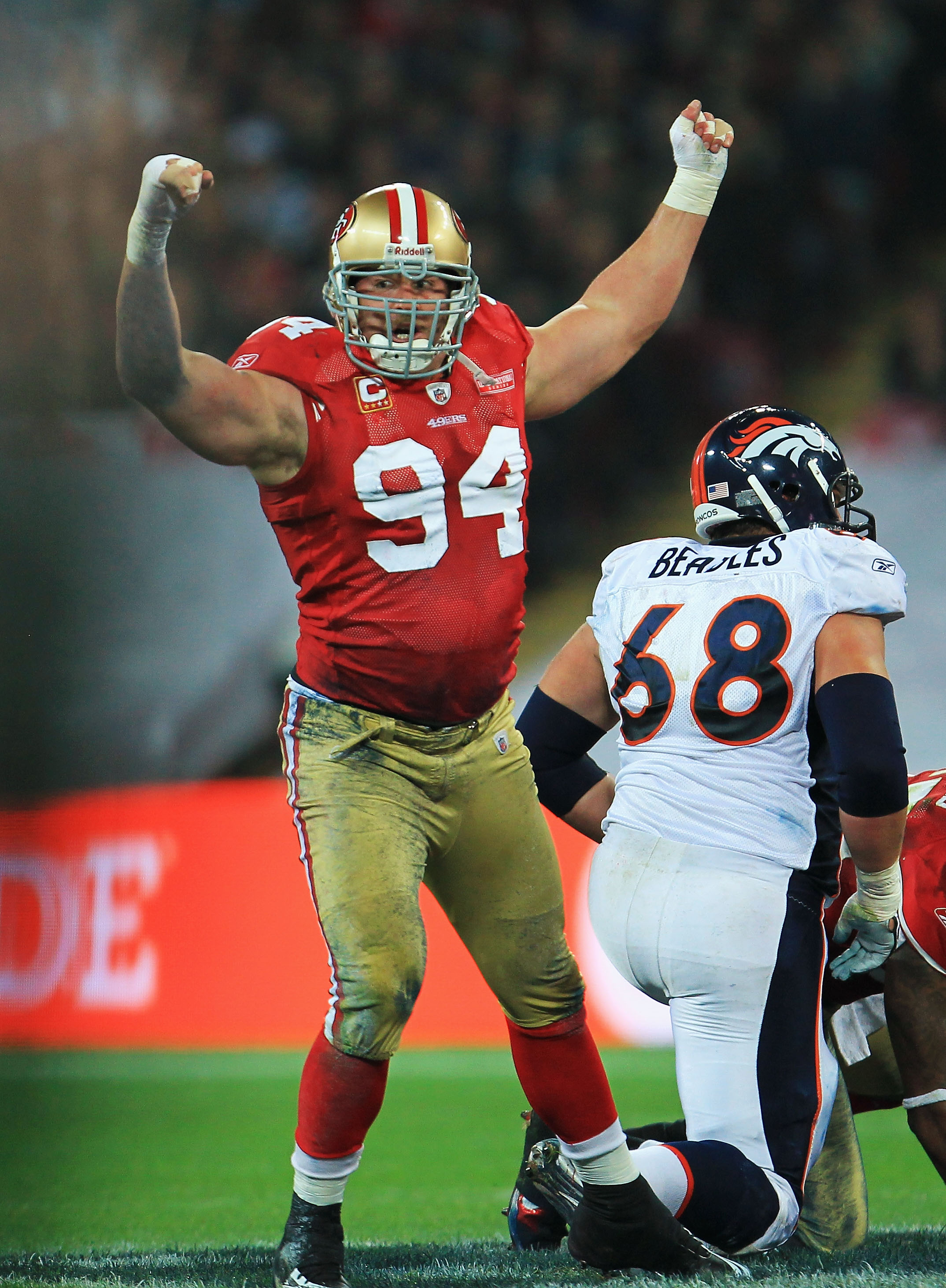
The San Francisco 49ers defensive front did well against the run. The front seven did not allow a 100-yard rusher all season. Justin Smith was the star of this unit, as he had 70 tackles and was credited with nine sacks. No other 49ers defensive lineman had even 40 tackles and their combined total number of sacks was two.
Justin Smith was selected to the Pro Bowl and deservedly so. His energy, hustle and 100 percent effort were an inspiration to his teammates.
Nose tackle Aubrayo Franklin held out until just before the season began. He was adequate, but did not have the dominating year he had in 2009. As a free agent with the salary level he will demand, coupled with his less-than-stellar season, I do not think he will return in 2011.
The left defensive end, Isaac Sopoaga, was decent against the run, but provided almost no pass rush. As a starter, Sopoaga had only two sacks.
There are several very talented defensive linemen in this year's draft, probably more than in any prior draft. If the 49ers use their top pick to draft a strong pass-rushing defensive lineman, it would be a wise move for the 49ers.
Reserves Ray McDonald, Demetric Evans and Ricky Jean-Francois did not make much of an impact. Jean-Francois could be in line to start at the nose tackle spot, assuming the Niners elect to let Franklin depart.
Defensive Line: Grade = C+
Linebackers: Grade = B-
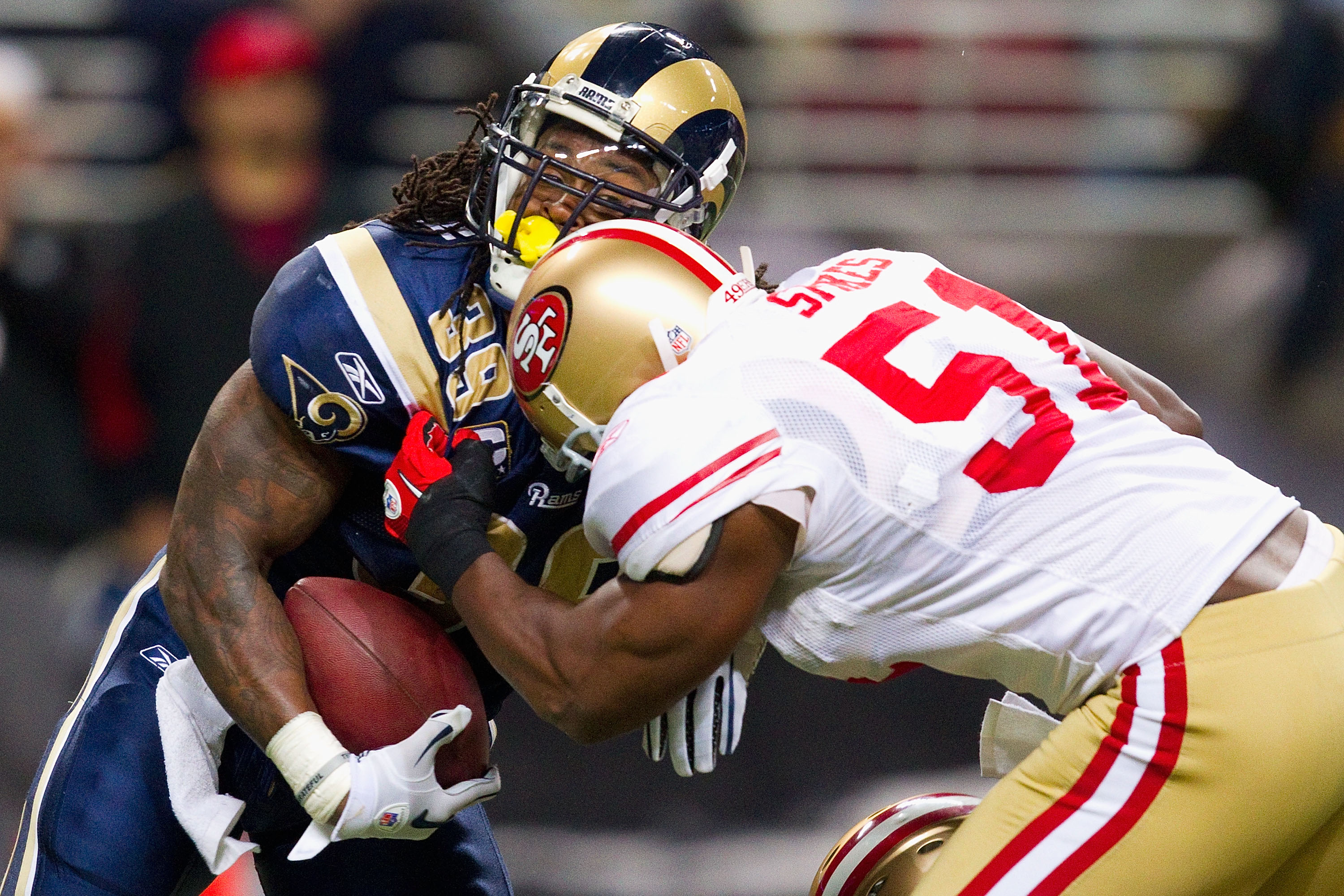
In addition to Justin Smith, the only two 49ers defenders that I feel played well are linebackers Patrick Willis and Takeo Spikes. These two anchored the inside run defense for the 49ers and also were team leaders.
Patrick Willis was again selected to the Pro Bowl. He led the 49ers defense with 128 tackles, including six sacks. In his fourth year with the 49ers, Willis is their lone superstar. I believe his No. 52 will someday be retired among the 49ers all-time greats.
Takeo Spikes had a stellar season and was voted by his teammates the Len Eshmont Award winner. This award is the highest honor a 49ers player can receive from his fellow players. It symbolizes inspirational and courageous play and Spikes definitely earned the honor;
Takeo Spikes was second on the team with 109 tackles and also grabbed three interceptions. He just completed his 13th NFL campaign and was devastated when the 49ers did not make the playoffs. An outstanding player, Spikes has never been to the playoffs.
As a free agent, it will be interesting to see if he signs with San Francisco. When asked if he would continue playing, Spikes said yes and eloquently stated: "there's still sap in the tree"
Outside linebackers were a different story. Manny Lawson was adequate, although did not have the kind of impact season the 49ers were hoping. He makes some outstanding plays showcasing his athleticism, then disappears for long stretches.
As a free agent, it will be interesting to see if Lawson returns to the 49ers. He will want fairly big money, but his numbers were quite pedestrian, with 59 tackles, three sacks and one interception.
The weakside linebacker spot was a disappointment, as three players underachieved. Starter Parys Haralson was inconsistent, as were subs Travis LaBoy and Ahmad Brooks.
The three combined for 14 sacks and seemed to thrive when the opposition was weak, but were non factors against the better teams. Inconsistency from this trio hurt the 49ers defense and this could be an excellent spot for an impact free agent pick up.
Linebackers: Grade = B-
Defensive Backs: Grade = F
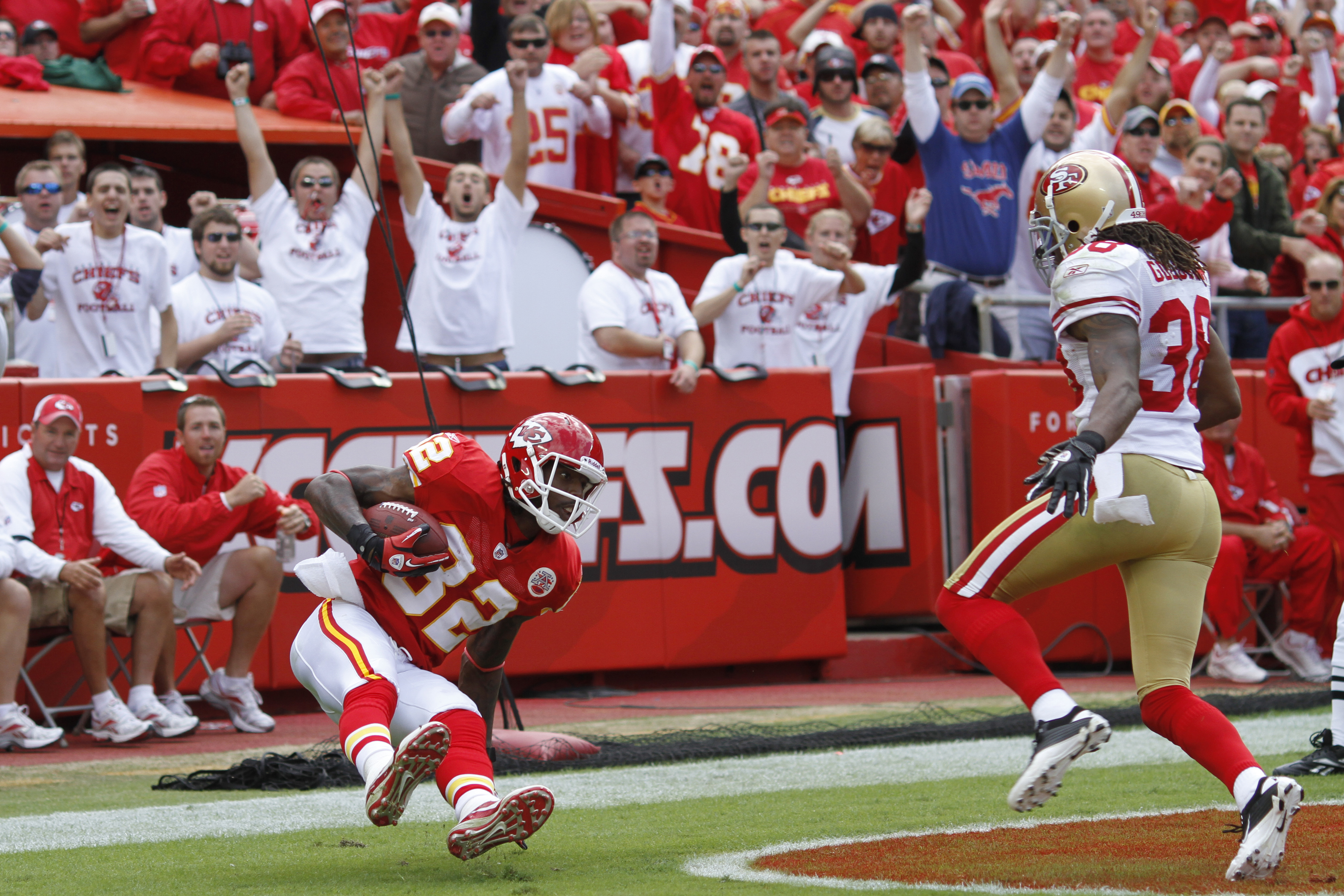
The San Francisco 49ers defensive secondary was the worst unit on the team. The pass coverage was 24th in terms of yards allowed and gave up a whopping 65.1 percent completion rate. Only two teams were worse in terms of completion percentage allowed.
Part of these poor statistics can be attributed to an inconsistent pass rush, but the lions share of the problem must be foisted on the defensive backs.
Nate Clements was routinely beaten deep, as he was over aggressive and tried to jump routes, gambling for interceptions. At age 31 and coming off a season-ending leg injury in 2009, Clements also has lost a step or two and is very susceptible to speedy receivers.
Nate Clements is due to make over $7 million dollars in 2011. The 49ers should either move him to a safety position or nickel back or drop him altogether.
Shawntae Spencer, who plays the corner opposite Clements, was also victimized far too often. He was supposed to be the Niners' best cover man but he too gave up too many big plays.
The safety position also did not perform well. Dashon Goldson finished the 2009 season quite well and was expected to be an impact defender in 2010. Unfortunately, his play regressed as he had to take on the responsibility of making the defensive calls for the secondary.
Michael Lewis, who started the first three games of the season, abruptly quit the team when he was benched. The 49ers tried Taylor Mays, then Reggie Smith, both of whom were sub-par.
Goldson and his counterpart Reggie Smith, who ultimately became the starter at the other safety spot, each had only one interception. This is far too few for the safety position and underscored the lack of big plays the 49ers defense was able to make.
Rookie Taylor Mays, a second round draft pick, seemed to fall further and further down the depth chart as the season progressed. He was passed by Smith and Tarell Brown, who became the nickel back. By the end of the season, Mays was relegated to being a special teams player.
The defensive backfield is abysmal and needs to be upgraded. There are two potential lock down cover corners in the upcoming draft, Patrick Peterson and Prince Amukamara. If one of these two are available with the seventh pick, either would be an excellent fit for the 49ers.
Defensive Backs: Grade = F
Special Teams: Grade = C
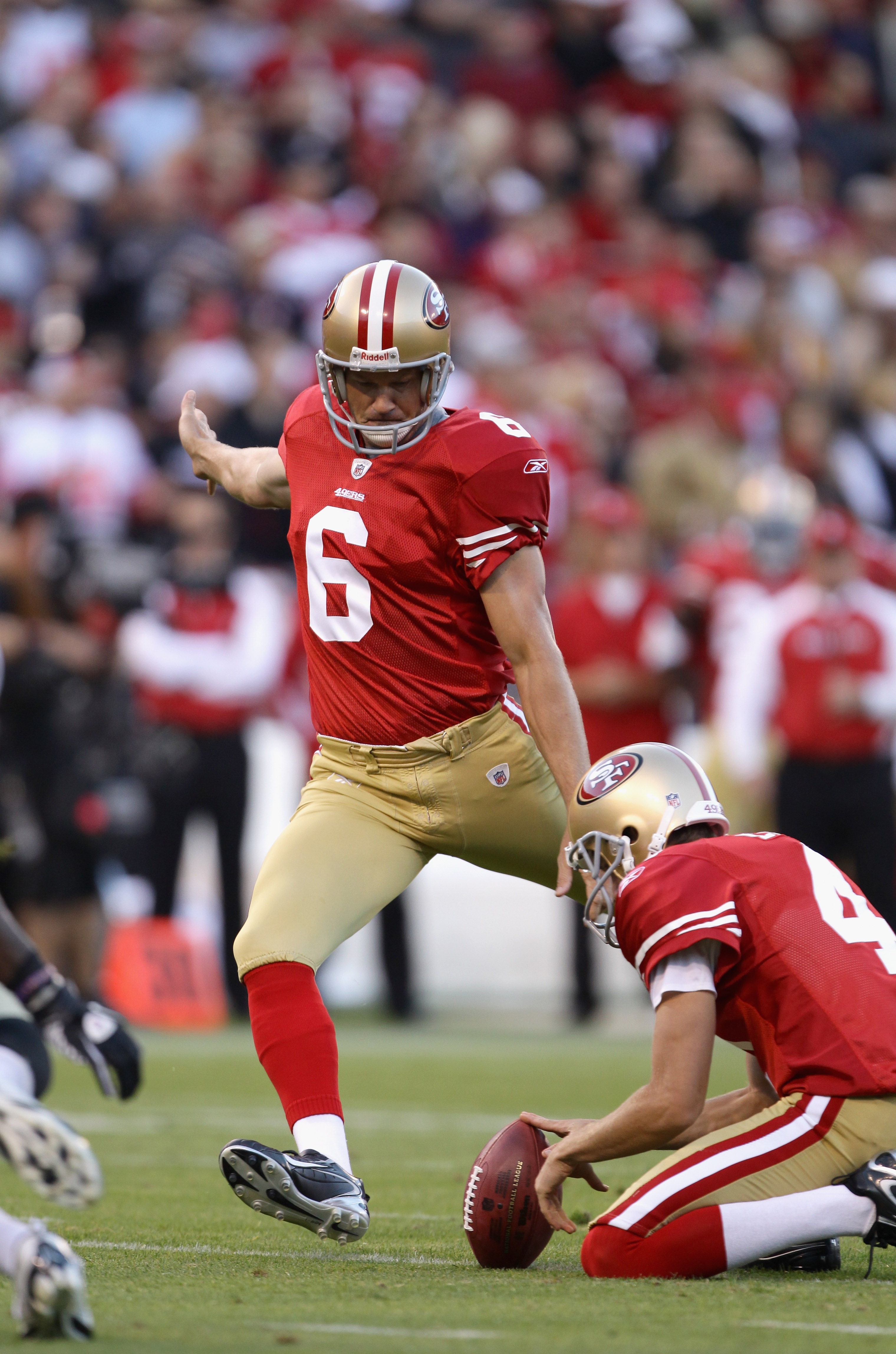
The special teams for the 49ers were adequate. They were generally OK, had a few big plays and gave up a few big plays.
Field goal kicker Joe Nedney is solid and when he was lost for the season due to injury, Jeff Reed stepped in and did a credible job. Combined, these two were 20-23 in field goals, which is very good.
Punter Andy Lee is also a solid veteran. His average of 46.2 yards is excellent and he also does a good job of pinning opposing offenses inside their 20 yard line, with 34 of his 91 punts inside the opponents 20.
The coverage units were decent and generally did a passable job. The lone exceptions were Reggie Bush in the Saints game and a crushing return by Danny Amendola for the Rams, which helped seal the Niners' fate in the penultimate game of the season.
Kickoff and punt returns were mostly handled by Ted Ginn Jr. and he was pretty good. His 21.1 yards per kickoff return was solid, as was his 13.4 average on punt returns. Ginn also returned one punt for a touchdown. He does tend to let too many punts hit the ground, which risks your blocker being hit by the ball and also gives up yardage when the ball bounces down the field.
Rookie Kyle Williams was supposed to make an impact in the return game, but he dealt with nagging injuries all year and hardly saw the field. He will need to prove that he can stay healthy or he will be waived before the 2011 regular season gets underway.
Spacial Teams: Grade = C
Coaching: Grade = F
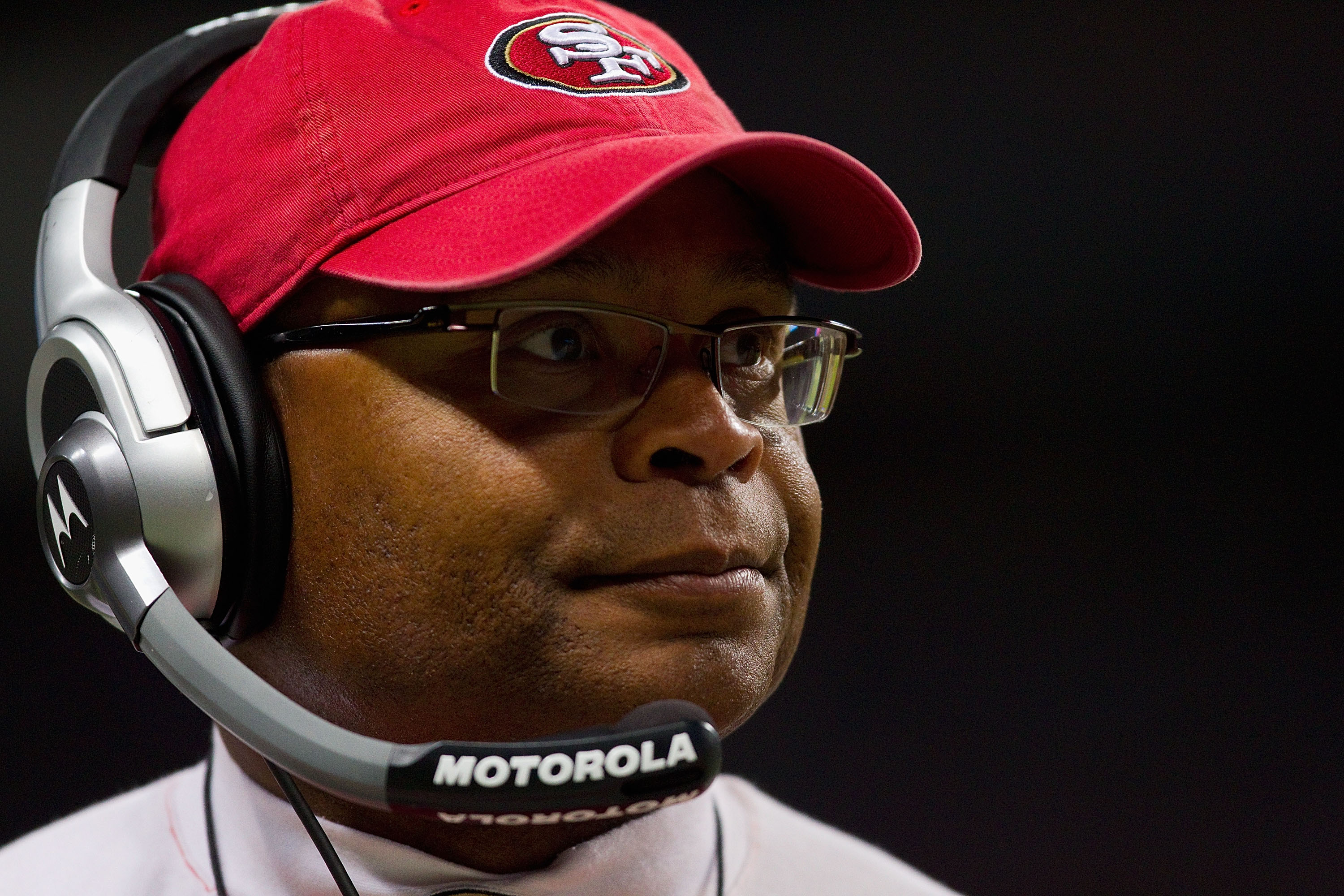
Many of the problems with the San Francisco 49ers start from the top down. That being said, I must give the 49ers coaching staff, and Mike Singletary in particular, an F.
I am a big fan of Mike Singletary as a human being. He has an incredible work ethic, is loyal and dedicated to achieve his goals. Singletary, through sheer will, got the team turned around in 2009 with an 8-8 record. He instilled a sense of hard work to a team where that was lacking. Unfortunately, 2010 was a different story.
Mike Singletary's inexperience as a head coach cost him his job. He hired a weak offensive coordinator in Jimmy Raye and then, after Raye was fired, went with an inexperienced Mike Johnson. Through it all, Singletary did not let these offensive people do their jobs. He wanted to formulate the game plans and have substantial input on the play calling, which ultimately was a huge factor in his demise.
I, for one, was happy when the 49ers hired Mike Singletary. He got off to a good start, but could only take the team so far. Again, he is a good man and I wish him well. He just did not have the experience to be a good head coach.
The 49ers were an undisciplined team and made the same mistakes and committed the same egregious penalties late in the season as they had at the beginning. This all comes down to coaching and discipline.
The other key factor was that Singletary's intensity was intimidating to many of the players. The team played tight and when you're looking over your shoulder, you do not play well. Vernon Davis alluded to this issue following the Niners' last game of the season.
The 49ers are now looking for a head coach. This decision will go a long way towards determining the future of the franchise for the next several years.
Team president Jed York has been courting Jim Harbaugh, but it appears he will be heading to Miami. If Harbaugh goes to Miami, the Niners will look to plan B, which could mean Brian Billick, Marty Mornhinweg, Hue Jackson or someone else.
Coaching: Grade = F
The Focus Is Now On 2011
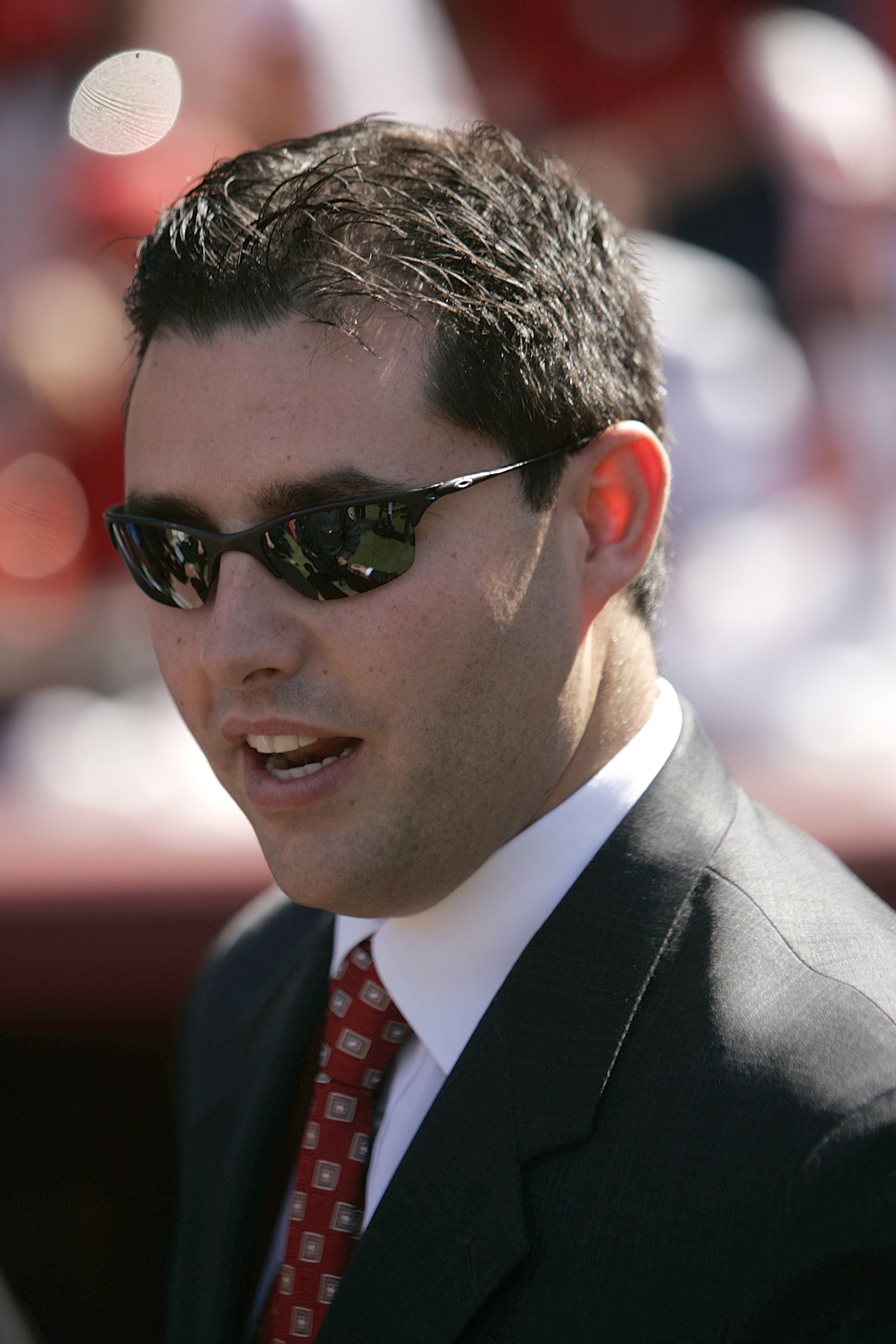
My overall final grade for the 2010 San Francisco 49ers is an F. A team that went 8-8 in the prior year, with all the playoff expectations heading into 2010, failed miserably. The 6-10 record deserves an F.
The 2011 season is crucial for the San Francisco 49ers. The near-term future of the franchise depends on the 49ers making the right decisions when it comes to the 2011 draft, getting a top-flight quarterback and a strong head coach.
I don't believe the overall talent is that far away from being a playoff team, especially in the NFC West. With some good drafting and adding a couple of impact free agents to upgrade their roster, the 49ers could be one of the best feel-good stories of 2011.
A good head coach, who can develop talent and put the players in the best position for success, is essential to the 49ers. Let's hope they choose wisely.
